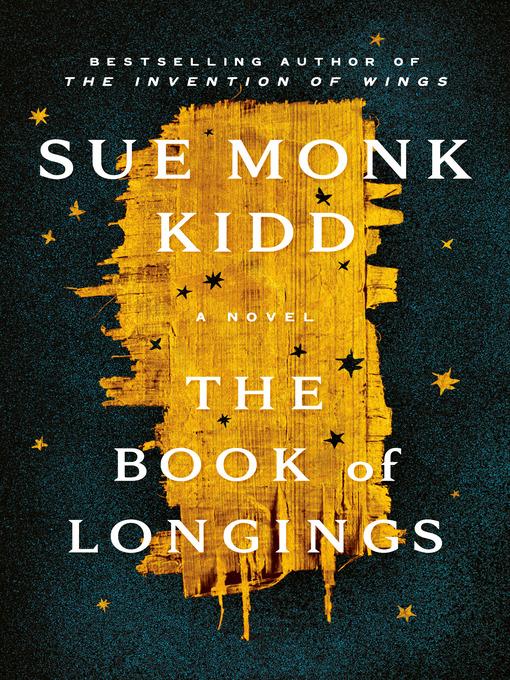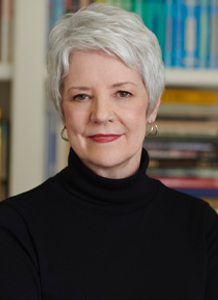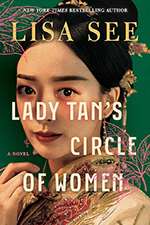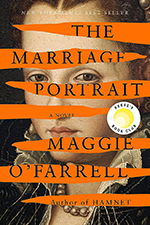 The Book of Longings
The Book of Longings
by Sue Monk Kidd
GENRE: Historical Fiction, Literary Fiction, Religion
A fictionalized account of an unknown aspect of Jesus Christ’s life. Told from the perspective of Ana, a strong-minded, intelligent young woman, this unusual novel explores the possibility of Jesus following in Jewish tradition and eventually marrying.
 Author Biography
Author Biography
Sue Monk Kidd was raised in the small town of Sylvester, Georgia, a place that deeply influenced the writing of her first novel The Secret Life of Bees. She graduated from Texas Christian University in 1970 and later took creative writing courses at Emory University and Anderson College, as well as studying at Sewanee, Bread Loaf, and other writers conferences. In 2016, TCU conferred on her an honorary doctor of letters degree.
Her book When the Heart Waits, published by Harper SanFrancisco in 1990 has become a touchstone on contemplative spirituality. In 1996, Harper published The Dance of the Dissident Daughter, describing Kidd’s journey into feminist theology, a memoir that had a groundbreaking effect within religious circles.
In her forties, Kidd turned her attention to writing fiction, winning the South Carolina Fellowship in Literature and the 1996 Poets & Writers Exchange Program in Fiction. Her short stories appeared in TriQuarterly, Nimrod, and other literary journals and received a Katherine Anne Porter award and citations in Best American Short Stories’ 100 Distinguished Stories.
When her first novel, The Secret Life of Bees, was published by Viking in 2002, it became a genuine literary phenomenon, spending more than 2½ years on the New York Times bestseller list. It has been translated into 36 languages and sold more than 8 million copies worldwide. Bees was named the Book Sense Paperback Book of the Year in 2004, long-listed for the 2002 Orange Prize in England, and won numerous awards. For over a decade, the novel was produced on stage by The American Place Theater, and in 2008 it was adapted into a movie by Fox Searchlight, which won the People’s Choice award for best movie and the NAACP Image award for best picture. The 2019 off-broadway production at The Atlantic Theater won the AUDELCO VIV award for best musical. The novel is taught widely in middle school, high school, and college classrooms.
Kidd’s second novel, The Mermaid Chair, has sold well over a million copies since its publication by Viking in 2005, reaching #1 on the New York Times bestseller list and remaining on the hardcover and paperback lists for nine months. Winner of the 2005 Quill Award for General Fiction, the novel was longlisted for the International IMPAC Dublin Literary Award, translated into 24 languages, and made into a television movie by Lifetime.
The spiritual essays, meditations, and inspirational stories Kidd wrote in her thirties were collected into a single volume, Firstlight: The Early Inspiration Writings and published by Guideposts Books in 2006 and Penguin in 2007.
After traveling with her daughter, Ann Kidd Taylor, to sacred sites in Greece, Turkey, and France, Kidd and Taylor co-authored a memoir, Traveling with Pomegranates: A Mother-Daughter Story. Published by Viking in 2009, it appeared on numerous bestseller lists, including the New York Times list and has been published in several languages.
The Invention of Wings, Kidd’s third novel was published in 2014 by Viking. It debuted at #1 on the New York Times bestseller list where it spent a total of 9 months. It has sold over a million copies and been translated into over 20+ languages thus far. The novel has won several literary awards, including the Florida Book of Year Award and the SIBA Book Award. It was also nominated for the International Dublin Literary Award and was chosen for Oprah’s Book Club 2.0.
Kidd’s much anticipated fourth novel, The Book of Longings, was published on April 21, 2020 to widespread critical and reader acclaim. It immediately landed at the top of the bestseller lists, reaching #5 on The New York Times Hardcover Fiction list, #1 on the IndieBound bestseller list, and #2 on the Associated Press bestseller List. The novel was a Book-of-the-Month Selection, Heather’s Pick (Indigo Books) in Canada, and Australian Women’s Day Great Read Pick. It has been translated into 17 languages thus far.
Kidd serves on the Writers Council for Poets & Writers, Inc. She lives in North Carolina with her husband, Sandy, and dog, Barney. - Author's website
Booklist
Historical novelists build their works around recorded history, creatively inventing characters and scenarios to fill liminal spaces. Along these lines, in a daring what-if, Kidd (The Invention of Wings, 2014) imagines Jesus Christ’s missing years and speculates that he followed Jewish tradition and therefore was married. The daughter of Herod Antipas’ head scribe, Ana, narrates her engrossing, briskly paced story in an appealing voice. Well-educated and impetuous, she loves to write, learns about women’s secret histories from her courageous aunt Yaltha, and chafes against gender restrictions. Shared intellectual curiosity and mutual respect mark her marriage to Jesus, a caring, devout stonemason who champions the downtrodden, and Kidd warmly presents their relationship. When God calls Jesus, however, Ana must, sadly, be left behind. From wealthy Sepphoris to humble Nazareth to Alexandria and beyond, Kidd describes a first-century world full of political and religious tensions, which feels simultaneously ancient and freshly awake with spiritual possibility. Ana’s feminist beliefs and pursuits may stretch credulity at times, but the message about the importance of kindness and the power of women’s voices should resonate strongly with today’s readers. HIGH-DEMAND BACKSTORY: Kidd is a library favorite, and the bold subject of this novel will increase buzz tenfold. -- Sarah Johnson (Reviewed 2/15/2020) (Booklist, vol 116, number 12, p26).
Kirkus Reviews
In Kidd's (The Invention of Wings, 2014, etc.) feminist take on the New Testament, Jesus has a wife whose fondest longing is to write. Ana is the daughter of Matthias, head scribe to Herod Antipas, tetrarch of Galilee. She demonstrates an exceptional aptitude for writing, and Matthias, for a time, indulges her with reed pens, papyri, and other 16 C.E. office supplies. Her mother disapproves, but her aunt, Yaltha, mentors Ana in the ways of the enlightened women of Alexandria, from whence Yaltha, suspected of murdering her brutal husband, was exiled years before. Yaltha was also forced to give up her daughter, Chaya, for adoption. As Ana reaches puberty, parental tolerance of her nonconformity wanes, outweighed by the imperative to marry her off. Her adopted brother, Judas—yes, that Judas—is soon disowned for his nonconformity—plotting against Antipas. On the very day Ana, age 14, meets her prospective betrothed, the repellent Nathanial, in the town market, she also encounters Jesus, a young tradesman, to whom she's instantly drawn. Their connection deepens after she encounters Jesus in the cave where she is concealing her writings about oppressed women. When Nathanial dies after his betrothal to Ana but before their marriage, Ana is shunned for insufficiently mourning him—and after refusing to become Antipas' concubine, she is about to be stoned until Jesus defuses the situation with that famous admonition. She marries Jesus and moves into his widowed mother's humble compound in Nazareth, accompanied by Yaltha. There, poverty, not sexism, prohibits her from continuing her writing—office supplies are expensive. Kidd skirts the issue of miracles, portraying Jesus as a fully human and, for the period, accepting husband—after a stillbirth, he condones Ana's practice of herbal birth control. A structural problem is posed when Jesus' active ministry begins—what will Ana's role be? Problem avoided when, notified by Judas that Antipas is seeking her arrest, she and Yaltha journey to Alexandria in search of Chaya. In addition to depriving her of the opportunity to write the first and only contemporaneous gospel, removing Ana from the main action destroys the novel's momentum. A daring concept not so daringly developed. (Kirkus Reviews, February 15, 2020).
 Lady Tan's Circle of Women
Lady Tan's Circle of Women
by Lisa See
According to Confucius, “an educated woman is a worthless woman,” but Tan Yunxian—born into an elite family, yet haunted by death, separations, and loneliness—is being raised by her grandparents to be of use. Her grandmother is one of only a handful of female doctors in China, and she teaches Yunxian the pillars of Chinese medicine, the Four Examinations—looking, listening, touching, and asking—something a man can never do with a female patient.
From a young age, Yunxian learns about women’s illnesses, many of which relate to childbearing, alongside a young midwife-in-training, Meiling. The two girls find fast friendship and a mutual purpose—despite the prohibition that a doctor should never touch blood while a midwife comes in frequent contact with it—and they vow to be forever friends, sharing in each other’s joys and struggles. No mud, no lotus, they tell themselves: from adversity beauty can bloom.
But when Yunxian is sent into an arranged marriage, her mother-in-law forbids her from seeing Meiling and from helping the women and girls in the household. Yunxian is to act like a proper wife—embroider bound-foot slippers, pluck instruments, recite poetry, give birth to sons, and stay forever within the walls of the family compound, the Garden of Fragrant Delights.
How might a woman like Yunxian break free of these traditions, go on to treat women and girls from every level of society, and lead a life of such importance that many of her remedies are still used five centuries later? How might the power of friendship support or complicate these efforts? Lady Tan’s Circle of Women is a captivating story of women helping other women. It is also a triumphant reimagining of the life of a woman who was remarkable in the Ming dynasty and would be considered remarkable today.
 The Marriage Portrait
The Marriage Portrait
by Maggie O'Farrell
Florence, the 1550s. Lucrezia, third daughter of the grand duke, is comfortable with her obscure place in the palazzo: free to wonder at its treasures, observe its clandestine workings, and devote herself to her own artistic pursuits. But when her older sister dies on the eve of her wedding to the ruler of Ferrara, Modena and Reggio, Lucrezia is thrust unwittingly into the limelight: the duke is quick to request her hand in marriage, and her father just as quick to accept on her behalf.
Having barely left girlhood behind, Lucrezia must now enter an unfamiliar court whose customs are opaque and where her arrival is not universally welcomed. Perhaps most mystifying of all is her new husband himself, Alfonso. Is he the playful sophisticate he appeared to be before their wedding, the aesthete happiest in the company of artists and musicians, or the ruthless politician before whom even his formidable sisters seem to tremble?
As Lucrezia sits in constricting finery for a painting intended to preserve her image for centuries to come, one thing becomes worryingly clear. In the court’s eyes, she has one duty: to provide the heir who will shore up the future of the Ferranese dynasty. Until then, for all of her rank and nobility, the new duchess’s future hangs entirely in the balance.
 Matrix
Matrix
by Lauren Groff
Cast out of the royal court by Eleanor of Aquitaine, deemed too coarse and rough-hewn for marriage or courtly life, seventeen-year-old Marie de France is sent to England to be the new prioress of an impoverished abbey, its nuns on the brink of starvation and beset by disease.
At first taken aback by the severity of her new life, Marie finds focus and love in collective life with her singular and mercurial sisters. In this crucible, Marie steadily supplants her desire for family, for her homeland, for the passions of her youth with something new to her: devotion to her sisters, and a conviction in her own divine visions. Marie, born the last in a long line of women warriors and crusaders, is determined to chart a bold new course for the women she now leads and protects. But in a world that is shifting and corroding in frightening ways, one that can never reconcile itself with her existence, will the sheer force of Marie’s vision be bulwark enough?